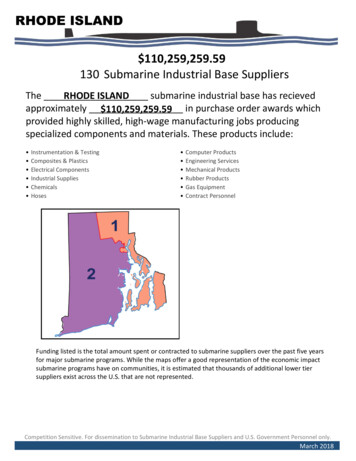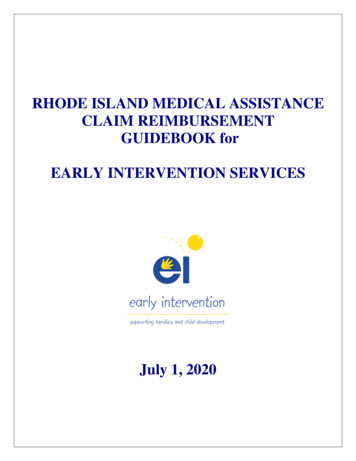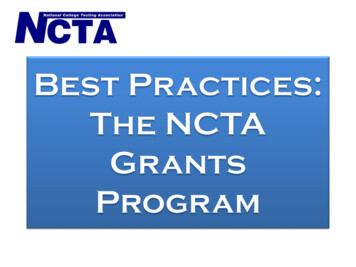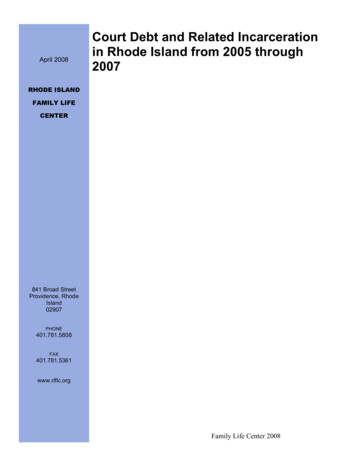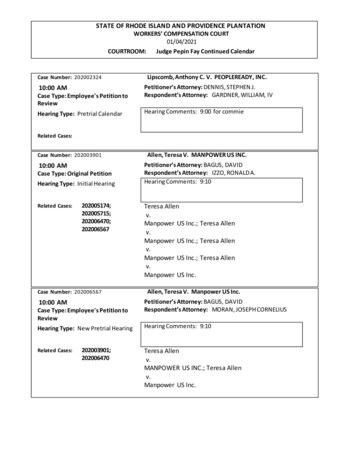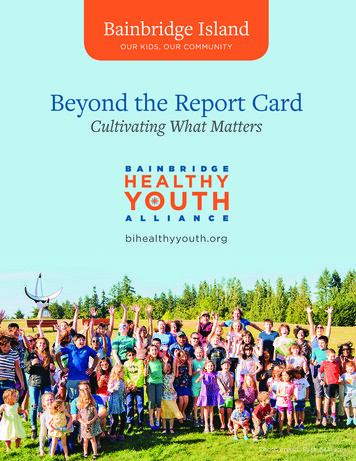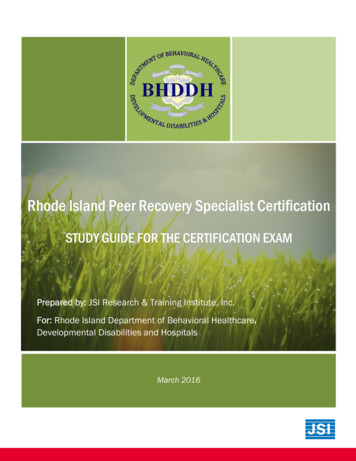
Transcription
Rhode Island Peer Recovery Specialist CertificationSTUDY GUIDE FOR THE CERTIFICATION EXAMPrepared by: JSI Research & Training Institute, Inc.For: Rhode Island Department of Behavioral Healthcare,Developmental Disabilities and HospitalsMarch 2016
ACKNOWLEDGEMENTS & FUNDING STATEMENTThe Rhode Island Peer Recovery Specialist Certification Guide: A Study Guide for theCertification Exam is a resource funded by the Department of Behavioral Healthcare,Developmental Disabilities and Hospitals (BHDDH) to serve as a study aid to assist peerrecovery professionals to prepare for and pass the Rhode Island Peer Recovery SpecialistCertification Exam. The guide was developed by JSI Research & Training Institute, Inc. undercontract with BHDDH. Funding is provided by the Substance Abuse and Mental HealthServices Administration (SAMHSA) through a contract with the Center for Social Innovations(CSI). The contents of this Guide do not necessarily represent the official views or policies ofSAMHSA, CSI or BHDDH.PARTNER AGENCIESAnchor/The Providence CenterCommunity Care AllianceMental Health Association of Rhode IslandMHCA-RI OasisNAMI Rhode IslandParent Support Network of Rhode IslandRhode Island Coalition for the HomelessRhode Island CollegeRhode Island Communities for Addiction Recovery Efforts, Inc.Rhode Island Department of Behavioral Healthcare, DevelopmentalDisabilities and HospitalsRhode Island Executive Office of Health and Human ServicesRhode Island Family Treatment Drug CourtSubstance Use and Mental Health Leadership Council of Rhode IslandThe Galilee Mission, Inc.RI Peer Recovery Specialist Certification Exam Study Guide Page 1
TABLE OF CONTENTSIntroduction And Purpose . 3Getting Ready For The Exam . 5Major Concepts, Skill Areas, and DefinitionsThe Role of Peer Support In Recovery . 8Relationship Building and Communication Skills For Peer Recovery Specialists . 15Boundaries and Ethical Issues . 21Supporting Recovery and Wellness . 24Practice Exam Questions . 31Glossary. 38Appendix A. IC&RC Domains . 41Appendix B. Examination Reference List . 44RI Peer Recovery Specialist Certification Exam Study Guide Page 2
INTRODUCTION AND PURPOSEIntroductionA Peer Recovery Specialist is a trained individual who has lived experience with mentalillness and/or addiction to alcohol and/or other drugs who provides one-to-one strengthsbased support to peers in recovery. Peer Recovery Specialists work in a wide range ofsettings including community health and mental health centers, behavioral health programs,substance use treatment facilities, peer-run organizations, community-based organizations,emergency rooms, courts, homeless shelters and outreach programs. Sometimes, PeerRecovery Specialists are referred to as Peer Support Specialists.The Rhode Island Department of Behavioral Healthcare, Developmental Disabilities andHospitals (BHDDH) is committed to building and strengthening the recovery workforce inRhode Island. It supports training and professional development opportunities andfacilitation of the certification process for both beginning and experienced recoveryprofessionals. Toward these ends, BHDDH commissioned the development of this StudyGuide for individuals seeking to take the Peer Recovery Specialist Certification Exam offeredby the Rhode Island Certification Board.Purpose of the GuideThis Guide is designed as a study aid to help prepare for and pass the Rhode Island PeerRecovery Specialist Certification Exam. The content of the Guide is based on the knowledge,skills and job tasks derived from the 2013 Peer Recovery Job Analysis conducted by theInternational Certification and Reciprocity Consortium (IC&RC), which sets standards anddevelops examinations for the credentialing of prevention, substance use treatment, andrecovery professionals.The Guide was developed by JSI Research & Training Institute, Inc., in consultation withBHDDH, subject matter experts in the behavioral health field, and input from peer recoveryspecialists who have taken the certification exam, or are working in recovery settings inRhode Island.RI Peer Recovery Specialist Certification Exam Study Guide Page 3
Overview of the GuideThe first half of the Guide summarizes key concepts and strategies so that users can reviewcontent areas essential to peer recovery support practice, including: Guiding principles and aspects of recoveryRoles and core values of peer recovery specialistsRelationship building and communication skillsCultural competence in recovery supportBoundaries and ethical issues in peer recovery supportTrauma-informed approachesRecovery and wellness planningThe Guide begins with study tips and test-taking strategies. It includes 20 practice questionssimilar in format and level of difficulty to those on the exam, along with an answer key andexplanations of the correct responses. A glossary and list of references to consult for morein-depth review of important topics are also provided.For More Information:For information on Peer Recovery Specialist Certification in Rhode Island, please contact theRhode Island Certification Board (RICB): 401.349.3822, info@ricertboard.org,www.ricertboard.orgFor information about the exam itself, please consult the Candidate Guide for the IC&RCPeer Recovery Specialist Examination: www.internationalcredentialing.orgFor information about the Peer Recovery Specialists in Rhode Island, please contact theRhode Island Department of Behavioral Healthcare, Developmental Disabilities andHospitals (BHDDH): 401-462-1049, www.bhddh.ri.govRI Peer Recovery Specialist Certification Exam Study Guide Page 4
GETTING READY FOR THE EXAMAbout the Peer Recovery Specialist Certification ExamThe IC&RC Peer Recovery Specialist Certification Exam is 75 multiple choice questions.Scores are reported on a scale ranging from 200-800. You must receive a 500 to pass. Youwill have two hours to complete the exam. Listen to instructions from the examadministrator and read test instructions carefully. You will not be able to ask questions afterthe exam has started. Download the IC&RC Candidate Guide for the Peer RecoveryExamination for more information on exam administration, testing dates, rescheduling,cancelling, missed exams, exam rules and security, special accommodations, and scoring ofexams.How to Prepare for the Peer Recovery Specialist Certification ExamEven if you have been in the peer recovery field for years, it is important to prepare for thisexam. Start studying early, become very familiar with the contents of this Study Guide, andplan your test taking strategy. Everyone is different when it comes to test taking. Someprefer individual study while others require group study. Identify your personal preference onhow to prepare for the examination. Ask yourself, “How do I study the best?” Recall previoustests you have taken and decide what worked for you and what did not work for you in thesesituations.Below are study strategies, test taking techniques, and advice for the day before and day ofthe exam.Study StrategiesYou can prepare for the exam in multiple ways. This study guide is one way, but there aremany additional ways to reinforce your mastery of the Peer Recovery Specialist exam topics.Several suggestions are provided below.Mark your calendar. As soon as you choose an exam date, mark it on your calendar. Plan astudy schedule based on the number of days until the exam.Test yourself. Take a practice test to find out what you know and what you need to study.Find a practice test that's similar to the one you'll be taking.Work on weak areas. Review subjects that you are weakest on. If certain types of questionsgive you problems, focus on understanding them better.Make a daily study commitment. Block off some time each day to study. Creating a specifictime to study helps with time management and establishes predictable study habits.RI Peer Recovery Specialist Certification Exam Study Guide Page 5
Create Study Checklists. Use your study guide to outline key points for each of the domainareas. Pay attention to lists, steps, or categories.Focus on the Key Terms. Understanding key terms throughout this study guide is importantto mastering the exam; however don’t limit yourself to just the key terms.Create flashcards. Create flashcards with key terms or concepts, and quiz yourself or haveothers quiz you.Study with others. Group studying can be helpful for practicing questions or for reviewinginformation that might be unclear.Understand your learning style. Some people learn best by reading, some learn by hearing,and others learn best by doing. You may learn best through a combination of these styles.If a study strategy is not working for you, do not be afraid to try a different strategy. Find asystem that works for you and stick with it.Test Taking TipsGoing into a test with a good knowledge of basic test-taking techniques will help you do yourbest. Here is a sampling of common test-taking advice: Listen carefully to directions.Listen carefully to the test directions: How much time is available? How will the testbe scored? What advice, if any, is given about when to randomly guess on multiplechoice test questions? Does the test administrator have any special instructions? Understand a question before answering it.Read questions carefully prior to answering. When in doubt, eliminate choices thatyou know are wrong, and then choose an answer from the remaining choices. Thecorrect answer is always listed in multiple-choice exams. Review the choices.Read the question, try to think of an answer, and then look for it among the availableanswer choices. If that doesn't work, at least eliminate the choices that appear to bewrong prior to guessing an answer. Do not overanalyze; if you think a question is a“trick,” you may be over‐thinking the question. Review your work.Review your answers. The test is not over until the time is up, so use any extra timeto review your work. Stay as calm as you can.Stay calm and simply do the best job you can with the time available. Staying calmwill make you more efficient while you are answering. A sample strategy for calmingoneself is stretching and/or breathing deeply.RI Peer Recovery Specialist Certification Exam Study Guide Page 6
The Day Before and the Day of the ExamBefore the Test Eat well. Good nutrition helps you to concentrate and perform your best.Sleep well. While it may be helpful to review your study materials the day before theexam, do not pull an all-nighter. Get plenty of rest, and set your alarm!Bring the right supplies. Gather all materials you may need to bring with you, thenight before the exam. This may include pencils, erasers, pens, registrationpaperwork, photo identification or a watch to time your progress. Note: You will notbe allowed to bring study materials into the testing room.Arrive early. Give yourself plenty of time for traffic, parking, or other transportationconcerns that may arise.Follow your normal routine. Testing day is not the time to try something different.During the Test Read the directions. It’s important that you follow the instructions exactly.Review the whole test before you start. See how many sections and what types ofquestions are on the test. Determine how much time to allow for completing eachsection.Answer easy questions first. Doing this can jog your memory about useful facts andboost your confidence. You may also come across information that can help you withother questions.Answer every question. Try to answer every question; do not change an answerunless you are certain your first response is wrong.Identify key words. This helps you focus on the main idea of challenging questions.Use the extra time to proofread and review your answers.The above test-taking tips and strategies were adapted from the following sources:1 College Board. (2015). Big Future: How to Prepare for Admissions Tests2 eHow Vickie Christensen: What makes a Test Standardized?3 SABES Adventure in Assessment Volume 16. (2004). Learning Centered Approaches to Assessmentand Evaluation in Adult Literacy4 Illinois Certification Board. (2012). Illinois Certified Recovery Support Specialist Credential StudyGuideRI Peer Recovery Specialist Certification Exam Study Guide Page 7
THE ROLE OF PEER SUPPORT IN RECOVERYWhat is Recovery?“Recovery is a process of change through which individuals improve their health andwellness, live a self-directed life and strive to reach their full potential.”1“Recovery is what people experience themselves as they become empowered to managetheir mental illness and/or substance use disorder in a manner that allows them to achievea meaningful life and a positive sense of belonging in their community.”2Both these definitions apply to recovery from substance use and mental health disorders.Voices of Person-Centered RecoveryRI Bringing Recovery Support to Scale Technical Assistance Center Strategy (BRSS TACS) Curriculum,(Day 1, slide 29)1SAMHSA Working Definition, 20122Connecticut Department of Mental Health and Addictions Services, 2002RI Peer Recovery Specialist Certification Exam Study Guide Page 8
Aspects of RecoverySAMHSA has specified four major dimensions that support a life in recovery:1.Health: Managing one’s disease(s) as well as living in a physically andemotionally healthy way2.Home: A stable and safe place to live3.Purpose: Meaningful daily activities, such as a job, school, volunteerism,family caretaking, or creative endeavors, and the independence, incomeand resources to participate in society4.Community: Relationships and social networks that provide support,friendship, love, and hopeGuiding Principles of RecoveryRecovery Emerges from HopeThe belief that recovery is possible provides the essential andmotivating message of a better future—that people can and doovercome the internal and external challenges, barriers, andobstacles that confront them.Recovery is Person-DrivenRecovery is self-determined and self-directed, with individualsdefining their own life goals and designing their own unique pathto recovery.Recovery Occurs via Many PathwaysIndividuals are unique with distinct needs, strengths,preferences, goals, culture, and backgrounds that affect anddetermine their individual pathway(s) to recovery.Pathways may include: Support from families and in schools Peer support Faith-based approaches Clinical treatment Use of medications Other approachesGuiding Principlesof RecoveryFrom Substance Abuse andMental Health ServicesAdministration (SAMHSA):1. Recovery Emerges From Hope2. Recovery is Person-Driven3. Recovery Occurs via ManyPathways4. Recovery is Holistic5. Recovery is Supported byPeers and Allies6. Recovery is SupportedThrough Relationship andSocial Networks7. Recovery is Culturally-Basedand Influenced8. Recovery is Based on Respect9. Recovery is Supported byAddressing Trauma10. Recovery Involves Individual,Family, and CommunityStrengths & ResponsibilitiesRI Peer Recovery Specialist Certification Exam Study Guide Page 9
Recovery is HolisticRecovery encompasses an individual’s whole life, including mind, body, spirit andcommunity.Recovery is Supported by Peers and AlliesMutual support and mutual aid groups, including the sharing of experiential knowledge andskills, play an invaluable role in recovery.Recovery is Supported Through Relationships and Social NetworksAn important factor in the recovery process is the presence and involvement of people who: Believe in the person’s ability to recoverOffer hope, support and encouragementSuggest strategies and resources for changeRole model positive behaviors and attitudesRecovery is Culturally-Based and InfluencedCulture and cultural background in all of its diverse representations—including values,traditions, and beliefs—are keys in determining a person’s journey and unique pathway torecovery.Recovery is Based on RespectCommunity, systems, societal acceptance and appreciation for people affected by mentalhealth and substance use disorders—including protecting their rights and eliminatingdiscrimination—are crucial in achieving recovery.Recovery is Supported by Addressing TraumaServices and supports should be trauma-informed to foster safety (physical and emotional)and trust, as well as promote choice, empowerment, and collaboration.Recovery Involves Individual, Family, and Community Strengths & ResponsibilitiesIndividuals, families, and communities have strengths and resources that serve as afoundation for recovery.RI Peer Recovery Specialist Certification Exam Study Guide Page 10
How A Recovery Orientation Differs from a Treatment Orientation3Traditional Treatment StrategiesRecovery StrategiesPromote clinical stability, managing illnessPromote quality of life and recoveryFocus on illness, disabilities and deficitsFocus on wellness/health, abilities and choicesValue complianceValue active participation, empowermentOnly professionals have access to informationAll parties have access to the same informationLink to professional services onlyLink to diverse supports, including professionalservices, non-traditional services, and natural supportsRelies on facility-based settings and professionalsupportersIntegrated settings and natural supporters are alsovaluedSelf-determination comes after a person achievesclinical stabilitySelf-determination and community inclusion arefundamental human rights of all peopleEmphasize avoidance of riskEmphasize responsible risk-taking and growthWhat is Peer Recovery Support?People with mental and/or substance use disorders have a unique capacity to help otherswith similar disorders based on shared experience and a deep understanding of what theother person may be going through in recovery. Recovery support is the process of givingand receiving non-clinical assistance to help aid the process of recovery; peer recoverysupport is provided by individuals with lived experience in recovery.A Peer Recovery Specialist is an individual or family member who has lived experience withmental illness and/or addiction to alcohol and other drugs, and has also completed formaltraining, who provides one-one strengths-based support to peers in recovery (Rhode IslandBRSS TACS definition of Peer Recovery Specialist).RI BRSS TACS Curriculum: How a Recovery Orientation Differs from a Treatment Orientation, (Day 1, slides26-27)3RI Peer Recovery Specialist Certification Exam Study Guide Page 11
Goals of Peer Recovery SupportPeer recovery support assumes that everyone is capable of recovery, wellness and fulfillingtheir dreams. This strengths-based approach to recovery moves the focus away frompeople’s deficits and instead emphasizes strengths and capacities to resolve problems andcreate solutions. Peer Recovery Specialists work with their peers to: Instill hope Promote positive self-identity (reduce stigma*) Be a role model of strength, survival and growth Decrease isolation and promote connection with others Support person-centered recovery Engage in mutual learning—the peer support relationship is a relationship of equals*Stigma is the experience of being deeply discredited due to one’s perceived and undesireddifferentness. It is a cluster of negative attitudes or beliefs held by the general public aboutpeople with substance use disorders or mental illness.Types of Support Offered by Peer Recovery SpecialistsPeer Recovery Specialists offer four main types of support to their peers in recovery:1. Emotional Support: Demonstrate empathy and caring, foster self-confidence2. Informational Support: Provide health and wellness information as well asinformation about community services and supports available3. Instrumental Support (tangible support): Provide concrete assistance inaccomplishing tasks, such as help to obtain child care, employment or access tocommunity health and social services.4. Affiliational Support (support in building relationships): Promote social connectionsand engagement in communityRI Peer Recovery Specialist Certification Exam Study Guide Page 12
Specific Roles of Peer Recovery SpecialistsWhat do Peer Recovery Specialists do in working with people in recovery? Here are some ofthe roles Peer Recovery Specialist play, adapted from William White.4 A Peer RecoverySpecialists acts as: An Ally and Confidant, who cares about the person in recovery, actively listens tothem, and is trustworthy, stable and consistent. A Motivator and Cheerleader, who believes in the person’s capacity for change, andwho motivates, encourages, and celebrates their efforts and progress. A Role Model and Mentor, who offers their own life as an example of healthy living,“walks the talk”, and provides recovery information appropriate to where the personis in their recovery. A Truth Teller, who provides honest and helpful information, helps to identify patternsof behavior, offers suggestions, and does not “sugar coat” things. A Problem Solver, who helps identify potential problem areas, assists the person toproblem-solve, does not tell the person what to do but helps person with options in anon-judgmental way. A Resource Broker, who provides linkages to the recovery community, treatment andother support services, knows the local system of care and how to navigate it, andhas established contacts and partnerships in the recovery community. An Advocate, who assists and educates the person in recovery to protect their rights,and acts as a representative for them when requested.Peer Recovery Specialists may also act as advocates on a community level.White, W. (2006). Sponsor, Recovery Coach, Addiction Counselor: The Importance of Role Clarity and RoleIntegrity. Philadelphia, PA: Philadelphia Department of Behavioral Health and Mental Retardation Services.4RI Peer Recovery Specialist Certification Exam Study Guide Page 13
Limits of the Peer Recovery Specialist RoleA peer recovery specialist is NOT a: Therapist/Counselor: Does NOT offer counseling services Case Manager: Does NOT act as a case manager Nurse/Doctor: Does NOT offer medical or medication advice Sponsor: Does NOT act as sponsor in a twelve-step program for the peers they areworking with Clergy: Does NOT give religious advice or promote a particular religionSumming Up: Core Values of Peer SupportThese guidelines from the International Association of Peer Supporters provide a goodsummary of the key roles and the unique and effective approach that peer recoveryspecialists bring to their relationship with the peers they serve.Peer Support is Peer Supporters ARE: Voluntary: Supports choice Hopeful: Share hope Mutual and reciprocal: Encourages peers togive and receive Open-minded: Withhold judgment aboutothers Equally shared power: Embodies equality Empathetic: Listen with emotional sensitivity Strengths-focused: Sees what’s strong, notwhat’s wrong Respectful: Are curious and embracediversity Transparent: Sets clear expectations anduses plain language Honest and direct: Address difficult issueswith caring and compassion Person-driven: Focuses on the person, notthe problems Facilitate change: Educate and advocateInternational Association of Peer Supporters, inaops.orgRI Peer Recovery Specialist Certification Exam Study Guide Page 14
RELATIONSHIP BUILDING AND COMMUNICATION SKILLSFOR PEER RECOVERY SPECIALISTSEstablishing a respectful, trusting peer-peer relationshipThe Peer-Peer ConnectionHaving trusting, supportive relationships with family, friends, co-workers and others isstrongly related to people’s health, well-being and recovery.The power of peer recovery support stems from the fact that it is based on a trusting socialconnection between equals or “peers”. A peer is “a person that is of equal standing withanother.”5The trusting social connection between Peer Recovery Specialists and the people they areworking with is based on empathy—“the ability to understand and share the feelings ofanother”.6Empathy means listening for the feelings behind the person’s words, really paying attentionand “stepping into their shoes,” and validating their feelings.To keep empathy “turned on” talk less and listen more. Avoid these behaviors that interferewith empathy: Not responding to what the person has saidForcing your own interpretationMissing the feeling in what the person saidUsing clichés that minimize a person’s pain (for example, “time heals all wounds”)InterruptingFaking understandingRushing your responseTalking too muchA Relationship of EqualsWhat makes peer recovery support unique and effective is that it is based on a relationshipof two equal partners. This is sometimes called “mutuality” which means that “we’re in thistogether,” and that both partners learn together and progress in their recovery as a result ofthis relationship. The relationship is one of mutual respect.5Merriam –Webster Dictionary6Oxford DictionaryRI Peer Recovery Specialist Certification Exam Study Guide Page 15
Listed below are some actions or needs on the part of the Peer Recovery Specialist that canundermine this relationship of equals. As a Peer Recovery Specialist be on the lookout forthese and try to avoid them: A need to be liked and helpful (Wanting your peer to always like you can lead todishonesty and rescuing behavior). A need for status or prestige (Wanting your peer to be impressed with you can makeyour peer feel inferior). Need for control (This interferes with your peer’s self-determination, anddisempowers your peer). Perfectionism (May lead you to push and pressure your peer). Need for social relationships (May lead you to be overinvolved with your peer,crossing a boundary).Remember to keep the “peer” in peer recovery support.Important Communication SkillsUsing Person-Centered, Non-Judgmental, Empowering LanguageThe words we use are important, with the power to hurt or heal. As you talk with people bemindful of the power of language and keep these tips in mind. Don’t label people. Describing people by their addiction or mental illness (e.g.“druggie” or “bipolar”) is dehumanizing, hurtful and harmful. Use positive language that focuses on strengths rather than negative language thefocuses on deficits. Here are some examples.Negative/Deficient LanguagePositive/Mutual Language My illness My experiences What’s wrong with me? What’s happened to me? My consumers People I work with I’m here to help you I’m here to learn with you High-functioning, low-functioning Risking new thinking and behavior Coping Change patternsBRSS TACS Curriculum: Language Creates Reality (Day 2, slide 38)RI Peer Recovery Specialist Certification Exam Study Guide Page 16
Effective ListeningSome tips for being a good listener: Focus your attention on the speaker.Avoid distractions.Seat yourself appropriately close to the speaker.Acknowledge any emotional state.Set aside your prejudices and opinions.Be other-directed—focus on the person communicating.Follow and understand the speaker as if you were walking in their shoes.Be aware. Listen with your ears, but also with your eyes and other senses.Let the story or whatever the person is saying take its course. Don‘t interrupt.Be involved: actively respond to questions or directions. Use your body position (leanforward) and attention to encourage the speaker and signal your interest.Be aware of and avoid these barriers to effective listening:7 Assuming you know what the other person is thinkingListening selectivelyJumping to conclusionsLetting your mind wanderWorking on a response or solution while the other person is still talkingChanging the subject before the person is doneAutomatically agreeing before understanding completelyTalking About Change: A Few Key Principles of Motivational InterviewingMotivational Interviewing (MI) is a specific approach to helping people living with mentalillness, addictions or other chronic conditions make positive behavior changes to supporttheir overall health. To practice motivational interviewing techniques effectively it isimportant to take a training course.Motivational Interviewing gives a framework for having conversations that bring out aperson’s own internal motivation and thoughts about changing a specific health behavior.The goal is to guide the person to recognizing and solving their own challenges withchanging a behavior.7Recovery Support Specialist Training, Community Care AllianceRI Peer Recovery Specialist Certification Exam Study Guide Page 17
Here are some key principles of Motivational Interviewing: Change is up to the person. Express empathy and acceptance. Help the person recognize discrepancies between goals and current behavior. Avoid confrontation and “roll with resistance”. Support people’s belief in their ability to succeed in accomplishing a task andencourage optimism.Motivational interviewing is a non-judgmental process and is designed to help build theperson’s self-efficacy. Self-efficacy is a person’s confidence that they can solve problemsand make changes successfully on their own. It is based on the belief that they themselvesare in control.Motivational Interviewing sometimes involves working with the person to develop a
professionals. Toward these ends, BHDDH commissioned the development of this Study Guide for individuals seeking to take the Peer Recovery Specialist Certification Exam offered by the Rhode Island Certification Board. Purpose of the Guide This Guide is designed as a study




